Five Books About Games to Start Off With
One question that I’ve been receiving a lot recently is “what books on gaming would you recommend?” I’m glad you asked, there is this strange misconception that the market for good video game criticism and elevated discussion around gaming is lacking.
This is patently false, a number of great essays and books on game studies and criticism exist in and out of academia. Academics like Ian Bogost and Eric Zimmerman formulate unified vocabularies for discussing games, and people like Anna Anthropy and Tom Bissell give highly personal and entertaining memoirs about their experience engaging with games on a number of levels. Outside of print media, YouTube channels like Super Bunnyhop and Errant Signal provide engaging criticism, and the blogosphere is brimming with great writers seeking exposure. But in no particular order, here are five books you can start off with.
1. How to do Things with Videogames by Ian Bogost
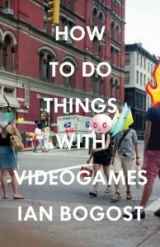
Ian Bogost is one of gaming academia’s most renowned names, his writing on game criticism and “procedural rhetoric” comprises much of the course material of introductory game studies courses. A pioneer in the field of “serious games”, his 2011 book How to do Things with Videogames documents the great potential that this growing medium has to affect all aspects of modern culture outside of entertainment. How to do Things With Videogames introduces readers to the abundance of games that engage with their societal context to make an impact on the lives of their players.
Essential reading for any practitioner of the medium, Bogost’s book awakens the incredible potential for the medium. Each chapter of the book deals with a different way games can be applied in society, ranging from advertising to relaxation, from political electioneering to empathy. As games begin to encroach into other aspects of life, Bogost posits that the idea of “gamer” as a distinct social identity will evaporate as games and play permeates into everyone’s life, a message that I’m sure we can all welcome.
ADDITIONAL READING
- Persuasive Games: The Expressive Power of Videogames by Ian Bogost
- Unit Operations: An Approach to Videogame Criticism by Ian Bogost
2. Rules of Play by Katie Salen and Eric Zimmerman
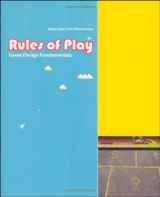
This seminal textbook is the result of over a century of theoretical work in defining and studying games as a cultural medium. Starting from the early 20th century writings of Huizinga’s “Magic Circle” to Richard Jenkin’s considerations of fan culture, academics Katie Salen and Eric Zimmerman have distilled a unified theoretical framework and vocabulary for designing and discussing any kind of game imaginable, from ancient strategy games to contemporary sports, from pen-and-paper role-playing games to big-budget first-person shooters. As an academic text, the content might come off somewhat dry to some gamers, and the study of games as “interactive systems” might offend some far-leaning narratologists, but make no mistake, this is an essential text for any game designer, and this medium is much richer because of it.
Rules of Play is structured around three main units, “Rules”, “Play”, and “Culture”, each deals with one facet of the holistic game. “Rules” deals with a number of schemas around the fundamental mathematical and emergent systems core to all games, such as uncertainty, information theory, and feedback loops. “Play” deals with the semiotics of games and the ways through which engaging interaction is achieved, and the constituent schemas deal with social networking, fixed and emergent narratives, and psychological conditioning and “flow”. The last lens is “Culture”, which transcends the Magic Circle to consider games as texts representative of the contexts from which they emerge. Together, the schemas work to create an essential framework for designing and studying games.
ADDITIONAL READING
- The Game Design Reader by Katie Salen and Eric Zimmerman
- Game Design Workshop by Tracy Fullerton
3. Rise of the Videogame Zinesters by Anna Anthropy
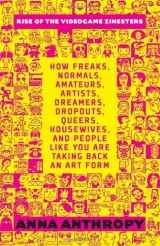
Rise of the Videogame Zinesters is inspirational. Dripping with electrifying excitement, Rise shakes its readers and demands that they all make games too. Anna Anthropy makes the case for easy-to-use game making tools like Twine and Game Maker, as well as democratized distribution methods like Newgrounds. She posits that the rise of platforms like YouTube and Tumblr have kicked down the door to content creation, allowing for a greater diversity of voices and backgrounds to participate in the generation of culture. While opening up content creation to the masses has resulted in an abundance of crappy media, the mere presence of such media makes our culture richer and more creative, filmmakers who would never had a chance in the Hollywood Studio System can now reach incredible popularity through Youtube. Anthropy sees a similar revolution coming up in videogames, and urges her readers to jump on that wave of opportunity and participate in game-creation for any reason whatsoever.
Structurally, the book embraces a punk-like aesthetic, arguing that all videogames have always represented the voices and personalities of their creators. That said, contemporary videogames have locked themselves into representing an extremely limited range of voices, leading to a substantial level of creative stagnation in the medium. Nonetheless, the success of Indies, game jams, and so-called “Zinester Games” shines a light of hope, and soon, we hope to see an incredible diversity of games employing any conceivable topic or mechanic. Anthropy simply asks that you, the reader, be part of this aesthetic flowering.
ADDITIONAL READING
- A Casual Revolution: Reinventing Video Games and Their Players by Jesper Juul
- Reality is Broken by Jane McGonigal
4. The Ethics of Computer Games by Miguel Sicart
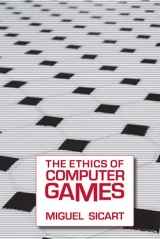
This excellent academic piece explores video games as a possibility space where players are permitted by game designers to perform ethically questionable actions, and the relationship between designers and players in dictating what is and is not moral in a game’s world. Refusing to relegate itself to sensationalistic media accusations and morally binary visions of ethical philosophy, The Ethics of Computer Games treats players as ethical agents acting within a complex network of moral duties and responsibilities set forth by game designers.
In a series of case studies, Sicart studies the ethical frameworks represented by single-player narrative games, competitive multiplayer games, and virtual worlds. Each study analyzes the different moral implications that the relationships between player-to-designer, and player-to-player cause to the definition of morality within interactive systems.
ADDITIONAL READING
- Understanding Video Games by Simon Egenfeldt-Nielson
- Grand Theft Childhood by Lawrence Kutner
5. Extra Lives: Why Video Games Matter by Tom Bissell
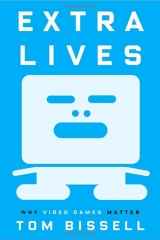
Tom Bissell’s 2011 memoir was incredibly influential to my own approach to video game criticism and influenced my own response to the Brown v. EMA Supreme Court Case. An impassioned defense of the medium, Bissell relates the myriad joys and pleasures that video games provide whilst struggling with the cognitive dissonance of embracing a lowbrow art form while practicing a highbrow one. The final chapter is a deeply personal and highly moving story of Bissell’s time playing Grand Theft Auto IV while lapsing back into cocaine usage, Niko Bellic’s struggle to escape the demons of his past starkly mirroring his own.
Extra Lives is divided into eight different chapters recounting Bissell’s experience with a particular game, ranging from Mass Effect to Braid. Each chapter reveals a facet of his complicated relationship with the medium while relating wonderful insights into the myriad effects, positive or negative, that these games have on our lives.
ADDITIONAL READING
- Masters of Doom by David Kushner
- All Your Base are Belong to Us by Harold Goldberg
Game studies is a growing field, and as graduates from programs such as USC, NYU, and Digipen begin to enter and influence the industry, we can be excited to see academia’s theoretical frameworks manifest in future games. If we are to elevate the discussion that goes on around games, it is necessary for the excellent writing that already exists around video games to receive greater exposure to mainstream audiences.
Do you have any books on game design or game studies you’d like to recommend? Share them in the comments!
What do you think? Leave a comment.











Great list! I recommend Fun Inc.
Oh and for fiction, nothing beats Ready Player One.
Seeing Extra Lives as cover for this was a good start, and the execution of the rest was as good. I am one of the rare breed mentioned at the beginning of Tom Bissell’s fine book—someone who reads criticism and also plays video games. For the few like us, that book was a long time coming.
check out the Kill Screen Daily, its work is influenced a lot by what he does. Re/Action Magazine is also being launched this month as an indiegogo, and is informed a lot by queer studies and criticism of games. You might like their stuff: http://www.reactionzine.com
As someone with very little gaming experience, this list is really helpful. Thank you!
You did this one well Kevin. Do you have any plans to write a piece about books to read for game designers (contrast to game critics)?
Good idea, I’ll get to it one week!
as for game design, start off with Rules of Play by Salen and Zimmerman, its one of the most renowned textbooks out there on game design. The Art of Game Design by Jesse Schell is also highly renowned, as is Game Design Workshop by Tracy Fullerton. Also consider Chris Crawford’s “On Game Design”. They all provide a wealth of information on creating great games.
I second Chris Crawford’s book. This is very personal book, showing you the strenghts and weaknesses of his designs.
Tell you what. If you would have told me a week ago that one of my most entertaining reading session of the past years would be a biography of the lads who made the game Doom, I would have laughed my head off. And yet, this ended up being the case! What a fascinating read, impossible to put it down.
yeah, Masters of Doom is fantastic!
Fantastic list of relevant books on an emerging field of study. The Bogost and Sicart books, in particular, are must reads.
Great article! It’s good to see game criticism is getting the same attention as film or literary criticism. Good subject matter for this article!
Pretty much anything by Ian Bogost is great, especially Unit Operations. It is a good intro to both Object Orientated philosophy and games criticism in general.
I am currently working my way through Bogost’s How to do Things with Videogames and have listened to Bissell’s audiobook about a year or two ago. I like that you give a short synopsis and highlights for each book on this list, as sometimes I have trouble deciding what books to borrow from the library based on just goodreads’ lists alone.
I didn’t realize Rules of Play was that in-depth. I may have to delve into that one in the near future, as I’m planning to do a thesis related to games and culture.
An audiobook I finished recently that might be worth putting up here is Super Mario: How Nintendo Conquered America. Although it is not strictly games criticism, it does discuss why games like Donkey Kong and Super Mario Bros. became culturally influential, among other things.
I hear Jesse Schell’s book The Art of Game Design: A Book of Lenses is a useful book for analyzing games. Jesper Juul’s done work on casual games in A Casual Revolution: Reinventing Video Games and Their Players and also examines how failure is integral to our enjoyment of videogames in The Art of Failure.
Thanks again for this article full of interesting recommendations!
Interesting topic of choice, I wouldn’t have thought to look for books like this. I’ll have to check some out.
I never knew there existed this much literature about video games. Thanks for introducing me to these.